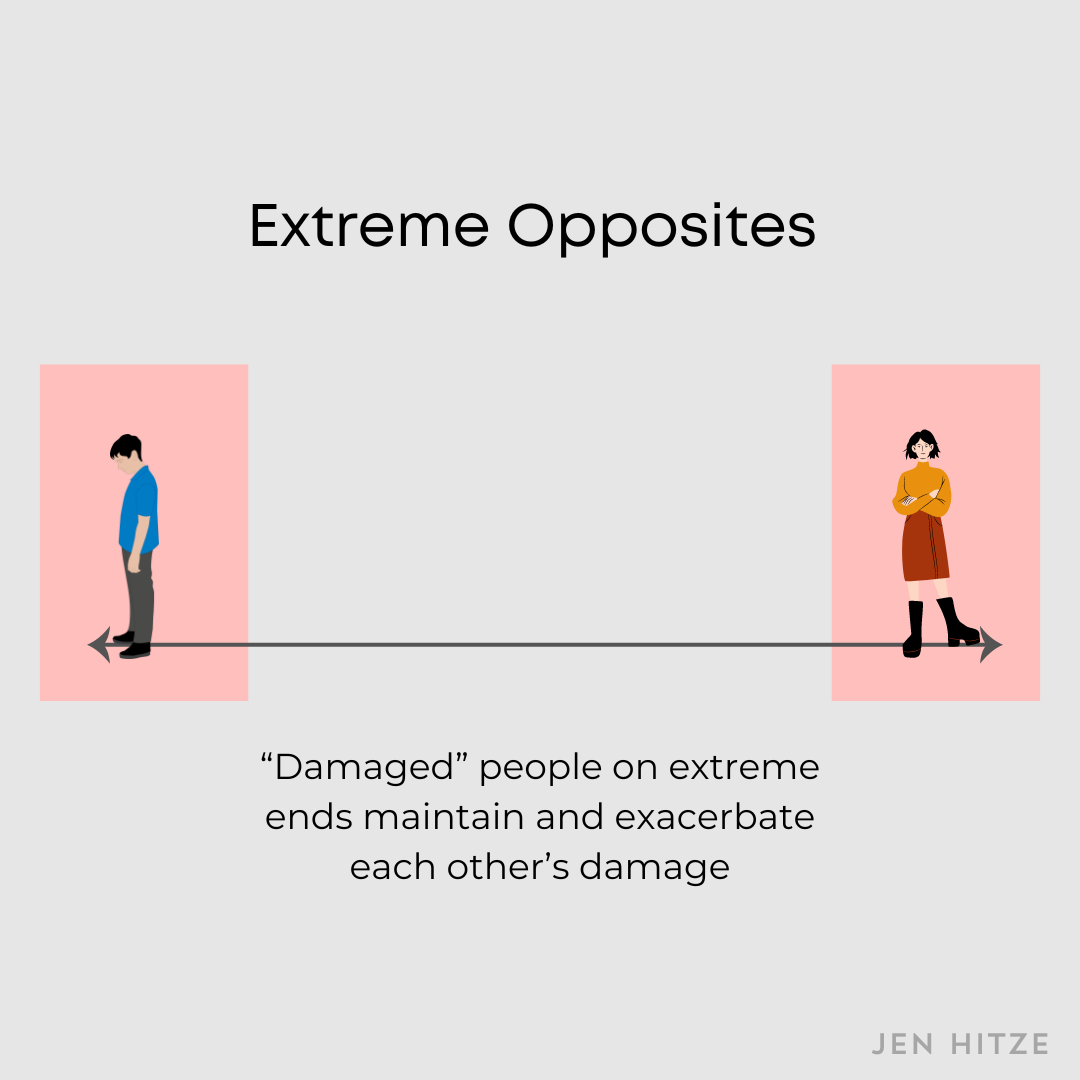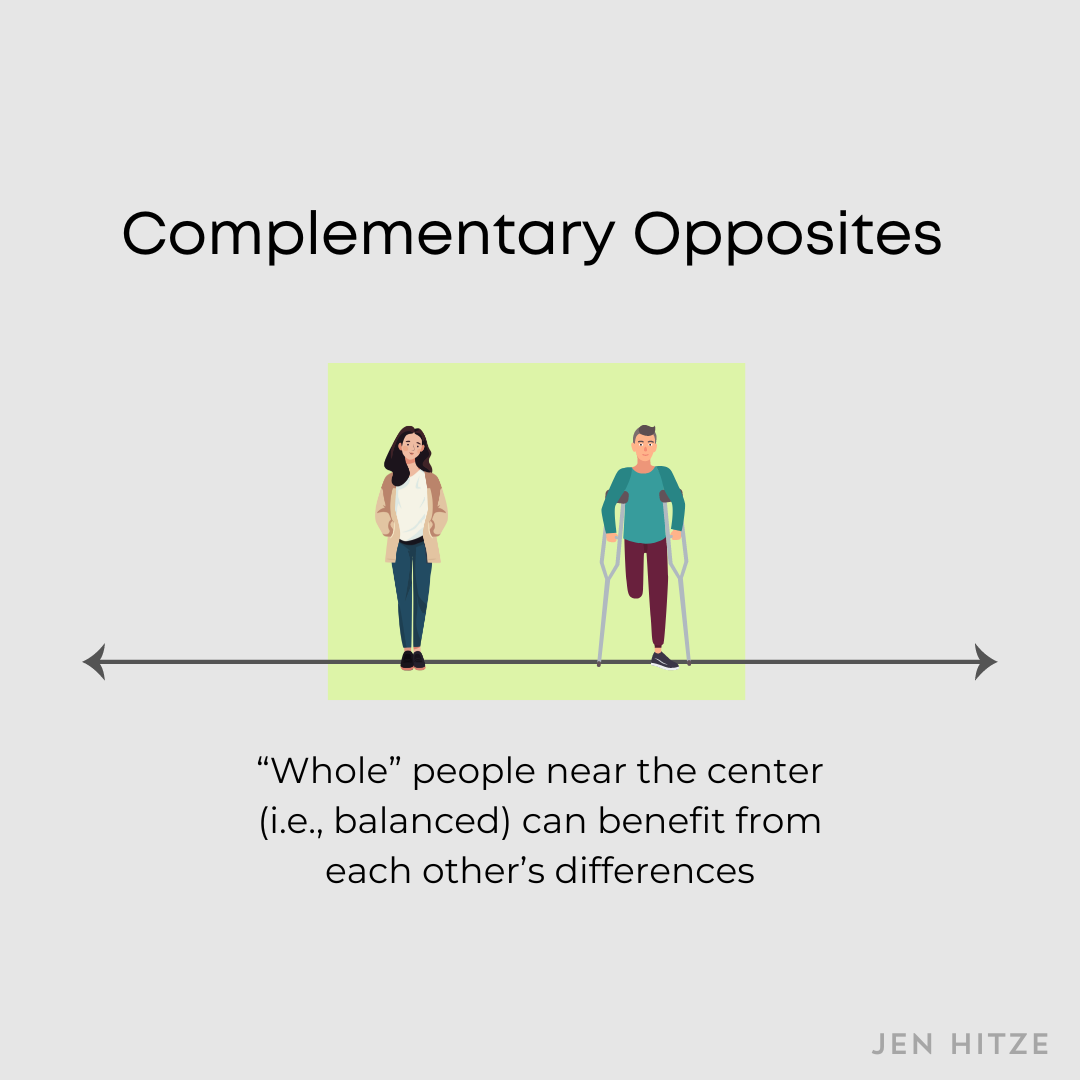From Codependency to Companionship
Diversity of Thought, Entitlement, Chemistry, Fix Yourself, Healthy Relationships
I.
Diversity of Thought
Many people are drawn to partners with opposite, complementary qualities. For example, an introvert might be captivated by the outgoing nature of an extrovert, while the extrovert may find the introvert’s characteristics comforting. Complementary qualities can benefit both individuals in a relationship by pushing them out of their comfort zones and exposing them to new perspectives and experiences. Examples of such opposite qualities include:
Planner and spontaneous
Creative and analytical
Risk-adverse and risk-taker
Saver and spender
Pragmatist and visionary
Opposite qualities can be both healthy and desirable in relationships when there is regular communication, shared goals, and mutual respect. However, opposites can cause problems when a superiority/inferiority complex develops in the relationship. This happens when two damaged people with extreme opposite beliefs come together.
II.
Entitlement
While damaged people existing along the extremes could be suffering from a plethora of troubles, the root of their struggles is almost always the same: they’ve become entitled and self-centered.
Let’s take a look at how this dynamic manifests in people with two extreme opposite qualities:
The Victim
The victim is entitled because they get to blame all their problems on people and circumstances outside of themselves. This mindset allows them to avoid taking responsibility for their actions, as they’ve convinced themselves and others that they are not at fault. By making their countless problems the center of every discussion, they attract pity and attention—this behavior mirrors narcissism because the victim craves constant attention and special treatment. The victim believes they have the right to express toxic feelings like vindictiveness and envy, as they think it’s unfair that others don’t suffer as they do. When those closest to the victim start to question the truth and reality of their experience, the victim invents new problems and catastrophizes their situation.
The Savior
The savior, on the other hand, is entitled because they believe they have the power to fix others and solve their problems. This mentality allows them to neglect their own issues, as they are too busy taking on the responsibilities of others. By bearing the burdens of others, they present themselves as selfless martyrs and rescuers—this behavior also resembles narcissism because the savior has an inflated sense of self-importance and craves admiration. The savior believes they have the right to cross personal boundaries and control the lives of others because they think they are a Real Big Deal. When those closest to the savior begin to question the truth and reality of their experience, the savior doubles down on their haughtiness and is resentful when their efforts go unappreciated.
III.
Chemistry
Damaged people often gravitate towards other damaged people because they subconsciously believe they need someone else to make them whole. After all, “damaged” means incomplete, fractured, broken. When a damaged person meets another damaged person with opposite qualities, they feel an intense chemistry and sense the relationship will result in some exciting reaction. In contrast, a person who is unperturbed and self-assured may seem like a rather dull prospect.
Extreme opposites can include:
Manipulative and exploitable
Dominating and submissive
Impulsive and evasive
Vengeful and apathetic
Controlling and indecisive
In relationships between damaged people with extreme opposite qualities, a superiority/inferiority complex develops, which maintains and exacerbates the harmful belief patterns on both sides. The manipulator reassures their partner that they’re too naïve to make important decisions, while the vengeful person gaslights their apathetic partner. While it’s easy to place blame entirely on the domineering partner, the inferior partner enables the abuse by allowing it to persist, thus validating their partner’s sense of superiority.
This complex only arises from codependency—when both individuals agree to be dependent upon each other. The superior partner chooses to dominate, while the inferior partner chooses to be dominated. If the inferior partner refuses to be dominated, the superior one will not continue to use their partner in the same way they did when there were no reprimands for their behavior. Either the dynamic would have to change, or the relationship would end.
IV.
Fix Yourself
In any relationship in which two people become one, the end result is two half people.
Wayne Dyer, Your Erroneous Zones
Dependency is a choice. The most common reason why people choose dependency is to avoid facing their problems and taking responsibility for their lives. Just like the victim avoids responsibility by inventing problems, the savior avoids responsibility by focusing on the victim’s invented issues. Damaged people use each other like this to avoid living life.
Life is hard. There’s no doubt about it. And while staying in a toxic relationship can distract you from life’s problems, it will never take them away. If anything, it will make them worse.
So, how do damaged people become whole?
Damaged people undo damage by working on themselves. That’s the whole point of self-help: You must do it yourself; no one else can fix you. If you don’t love yourself—quirks and flaws and all—how do you expect to love anyone else? How do you expect to receive love?
Being “damaged” in this context doesn’t imply some physical impairment. Rather, the damaged people I’m referring to are psychologically damaged, likely since childhood. They’ve presumably learned harmful codependency strategies from their parents or caretakers and lacked exposure to healthy relationships. Becoming whole again requires doing the difficult inner work to make peace with yourself, and then bringing that peace with you into a healthy relationship.
V.
Healthy Relationships
Love does not consist in gazing at each other, but in looking outward together in the same direction.
Antoine de Saint-Exupéry (translation), Terre des Hommes
My current (and hopefully last) relationship has been the most exciting and boring relationship I’ve entered thus far. It’s been exciting as we’ve moved across the country, traveled throughout the US and Europe, rescued a dog, learned new hobbies, and experienced many changes. It’s been boring because neither of us manufacture unnecessary problems or start emotional fires.
Transitioning from an unhealthy, dependent relationship to a healthy, independent one shifts the source of excitement from internal, emotional conflicts to external, hands-on challenges. Instead of feeling intense chemistry rooted in conflicting beliefs, people in healthy relationships feel a deep sense of peace with one another. This makes communication easier, as there is no fear of accidentally saying the wrong thing. When communication becomes easier, alignment of goals and values does, too. Through effective communication, you can learn so much more about another person than you could through manipulating them or allowing them to manipulate you.
To form a healthy relationship with another, you must first form a healthy relationship with yourself. Independent, whole people don’t need other people to feel complete—they are complete because they take responsibility for their lives. Independent people do, however, want a romantic partner to learn from, create alongside, and to do life with.
Independent people can make a good team, and life is so much better with the right teammate.







Cheers to healthy and boring relationships! 🍾👍🏽💯
I laughed out loud when you described your current relationship as "exciting and boring." I can totally relate! I used to think that drama and conflict were signs of passion, but now I realize that true love is often found in the quiet moments.
It's the shared meals, the lazy Sundays, the inside jokes, and the unwavering support that really matter. It's not about fireworks and grand gestures, but the steady flame of a love that grows deeper with time.
So here's to the "boring" relationships! May they be filled with laughter, love, and a whole lot of shared adventures.